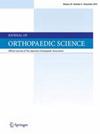Prognostic nutrition index as a predictive factor for overall survival in trabectedin-treated advanced soft tissue sarcoma
IF 1.5
4区 医学
Q3 ORTHOPEDICS
引用次数: 0
Abstract
Background
Trabectedin binds covalently to the DNA minor groove and causes DNA to bend toward the main groove, then trabectedin regulates the transcription of the involved genes in cell proliferation or acts on the mononuclear phagocyte system in tumors, which contributes to its antitumor effects. Several clinical trials confirmed the efficacy of trabectedin for patients with advanced soft tissue sarcoma (STS) although clinically useful biomarkers remained unidentified. This study aimed to identify prognostic factors of trabectedin treatment, especially focusing on the systemic inflammatory, immune response, and nutritional status.
Methods
This study included 44 patients with advanced STS treated with trabectedin from January 2018 to August 2022. We evaluated the associations of clinical factors that influence the efficacy of trabectedin treatment with progression-free survival (PFS) and overall survival (OS), focusing on systemic inflammatory, immune response, and nutritional status represented by the absolute lymphocyte count (ALC), neutrophil-to-lymphocyte ratio (NLR), platelet-to-lymphocyte ratio (PLR), lymphocyte-to-monocyte ratio (LMR), systemic inflammation response index (SIRI), prognostic nutrition index (PNI), and C-reactive protein (CRP) using the Kaplan–Meier method and the log–rank test.
Results
ALC, LMR, PNI, NLR, PLR, and SIRI demonstrated no association with PFS. Patients with CRP of ≥0.3 had a significantly shorter PFS than those with CRP of <0.3 (median PFS: 863 vs. 105 days, P = 0.045). PNI of ≥44 (median: 757 days vs. 232 days, P = 0.021) and CRP of <0.3 (median: 877 days vs. 297 days, P = 0.043) were significantly good prognostic factors in terms of OS.
Conclusions
The study results indicate pretreatment PNI and CRP levels as prognostic factors for trabectedin treatment in advanced STS.
预后营养指数是曲贝替定治疗的晚期软组织肉瘤总生存率的预测因素。
背景:曲贝替丁(Trabectedin)与 DNA 小沟共价结合,使 DNA 向主沟弯曲,然后曲贝替丁(Trabectedin)调节细胞增殖过程中相关基因的转录,或作用于肿瘤中的单核吞噬细胞系统,从而产生抗肿瘤作用。几项临床试验证实了曲贝替定对晚期软组织肉瘤(STS)患者的疗效,但临床上有用的生物标志物仍未确定。本研究旨在确定曲贝替定治疗的预后因素,尤其关注全身炎症、免疫反应和营养状况:本研究纳入了2018年1月至2022年8月接受曲贝替定治疗的44例晚期STS患者。我们评估了影响曲贝替定疗效的临床因素与无进展生存期(PFS)和总生存期(OS)的相关性,重点关注以绝对淋巴细胞计数(ALC)为代表的全身炎症、免疫反应和营养状况、中性粒细胞与淋巴细胞比值(NLR)、血小板与淋巴细胞比值(PLR)、淋巴细胞与单核细胞比值(LMR)、全身炎症反应指数(SIRI)、预后营养指数(PNI)和 C 反应蛋白(CRP)。结果显示ALC、LMR、PNI、NLR、PLR和SIRI与PFS没有关联。CRP≥0.3的患者的PFS明显短于CRP为结论值的患者:研究结果表明,PNI 和 CRP 水平是晚期 STS 患者接受曲贝替定治疗的预后因素。
本文章由计算机程序翻译,如有差异,请以英文原文为准。
求助全文
约1分钟内获得全文
求助全文
来源期刊

Journal of Orthopaedic Science
医学-整形外科
CiteScore
3.00
自引率
0.00%
发文量
290
审稿时长
90 days
期刊介绍:
The Journal of Orthopaedic Science is the official peer-reviewed journal of the Japanese Orthopaedic Association. The journal publishes the latest researches and topical debates in all fields of clinical and experimental orthopaedics, including musculoskeletal medicine, sports medicine, locomotive syndrome, trauma, paediatrics, oncology and biomaterials, as well as basic researches.
 求助内容:
求助内容: 应助结果提醒方式:
应助结果提醒方式:


